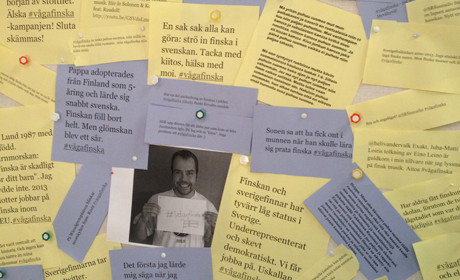
Some of the responses have been printed and posted on a noticeboard at Swedish Radio
Three weeks ago a Finnish language radio station in Sweden started a social media campaign to find out what people felt about speaking Finnish. They asked people if they "dare to speak Finnish when in Sweden".
The radio station, called Sisuradio, which is part of Swedish Public Radio's network of publicly-funded radio stations, related websites and social media accounts, decided to crowdsource responses using a hashtag which translates as 'dare to speak Finnish'.
And it generated a huge number of responses.
Pentti Lehtonen, a Finnish man who grew up in Sweden in the 1960s, joined Twitter to share the fact that when he was a child his mother called him Bengt, the Swedish equivalent of his name, when they were in public places, Helena Huhta, project manager at Finnblicken – a part of the station website – explained when Journalism.co.uk visited the offices of Swedish Radio last week. (His tweets are embedded in this post.)
"We found that people were ashamed of their heritage, they were ashamed to be from Finland and to speak Finnish here in Sweden," she said.
"Pentti told us on Twitter that it had affected his self-esteem, so we called him and extended the story."
A Finn living in Sweden herself, Huhta provided some background. There are about 700,000 people with a Finnish background who live in Sweden, she said. Many Finns moved in the 1960s and 1970s. "They are an interesting minority as their children and grandchildren are assimilated in Sweden," she explained.
"This population is quite invisible," she added. "It's a huge challenge to reach the group – which is why we thought the hashtag and social media would be a really good way to reach them."
Huhta and colleagues gathered responses, mainly via Twitter but also using Facebook, email, and to a lesser extent, Instagram.
They also tapped into their Public Insight Network, an audience database. An idea borrowed from the Public Insight Network in the US, of which NPR is a partner. Swedish Radio's netowrk allows listeners, readers and followers to suggest ideas for stories.
"It's like a huge address book or database where people register themselves and you send emails asking if anyone has ideas for stories," Yasmine El Rafie, Swedish Public Radio's social media development editor, said.
"You can't find these people, they have to come to you," El Rafie added. So the question was sent out to the network, and asked the question on the radio station.
The crowdsourcing exercise received contrasting responses from different generations.
"The image of Finns as second-class citizens still exists within the younger generation," said Ramin Farzin, manager of the insights network database at Swedish Radio.
"But we could see a difference between the older and younger generations. The younger generation has a different type of shame, that they can't speak Finnish fluently, not because they feel ashamed of their heritage, but because they were not brought up speaking Finnish as they were discouraged from doing so when they were young."
In addition to curating the responses, Farzin spent much of the week giving interviews to radio stations both in Sweden and in Finland after the story generated debate.
The emotive campaign gave people a voice, Huhta said. "Here in Sweden this Finnish minority haven't had opportunity to share their stories before," she said, explaining that people welcomed the chance to "share their own experiences, emotions and feelings".
Clarification: This article initially suggested the Public Insight Network was set up by NPR. Public Insight Network was created by American Public Media and NPR is a partner. The article has also been updated to clarify that Sisuradio is the station involved, while Finnblicken is a part of the station website.
Free daily newsletter
If you like our news and feature articles, you can sign up to receive our free daily (Mon-Fri) email newsletter (mobile friendly).
Related articles
- 12 essential self-taught journalism skills
- Paul O'Mahony, editorial product manager of The Local Sweden, on product thinking
- "Look at the robot as your new colleague": what automation can do for sports reporting
- Can an ‘encyclopaedia of opinions’ help us have healthier conversations?
- What happens when bots become editors?









